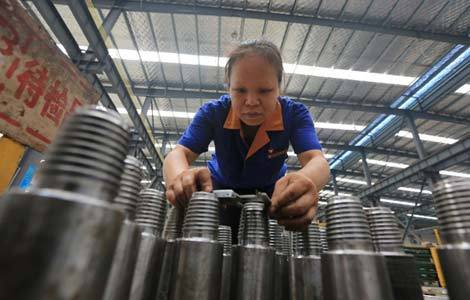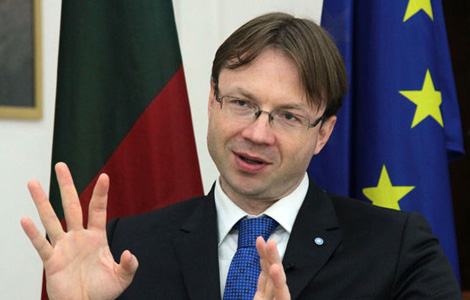Joint China-US Economic Track Fact Sheet
Updated: 2013-07-17 06:20
(US Department of Treasury)
|
||||||||
III. Enhancing Global Cooperation and International Rules
The United States and China committed to enhance cooperation, including under the G-20 and other multilateral frameworks. The two sides recognize the importance of international rules governing trade and finance that reflect the evolving global economic system and commit to take the following concrete steps to deepen our cooperation in this area.
• The two sides commit to strengthen coordination and cooperation within the G-20, seek more areas of common interest as well as to promote the G-20 as the premier forum for international economic cooperation. The two sides support prioritizing growth and jobs at the G-20 Summit in St. Petersburg and promoting strong, sustainable and balanced growth for the world economy by strengthening G-20 members’ macro-economic policy cooperation with due regard to the ramifications of those policies for the national and international economy. The two sides are committed to the G-20’s statements, including the commitments on growth, fiscal sustainability, structural reform, and IMF quota and governance reform, and exchange rates, and are to work with other G-20 members to meet the G-20 commitments. The two sides oppose all forms of protectionism, and support the G-20 in extending the standstill commitment with regard to measures affecting trade and investment as well as the pledge to roll back any new protectionist measures that may have arisen.
• The two sides commit to strengthen their cooperation in the IMF and G-20, continue to improve IMF’s quota and governance structure, ensure the completion of the 15th general quota review, and support the IMF executive Board’s decision to integrate the process of reaching a final agreement on a new quota formula with the 15th general quota review, and further enhance the voice of dynamic emerging markets and developing countries. The United States commits to implement the 2010 IMF quota and governance reforms. (2) Multilateral Development Bank (MDB) Reform: the two sides commit to strengthen their cooperation under the framework of the G-20, support governance and operational efficiency reforms together with the voice and representation reforms of the World Bank and other regional development banks, in order to ensure the MDBs’ relevance, accountability, effectiveness and legitimacy. (3) Selection of heads and management of the international financial institutions: the two sides support an open, transparent, and merit-based selection of heads and management.
• The two sides advocate that multilateral development banks increase their financial leverage ratio where possible without undermining their financial soundness, strengthening their lending capacity, deploy their full range of lending and knowledge instruments, and support client country priorities thereby expanding global aggregate demand and promoting world economic recovery and growth.
• The two sides commit to further strengthen coordination and cooperation in the APEC forum, in order to jointly promote economic growth and prosperity in the Asia-Pacific region. They commit to seek a closer partnership in APEC to ensure that the 2014 APEC Economic Leaders Meeting hosted by China promotes trade and investment liberalization and facilitation, strengthens regional economic integration and coordination, and carries out capacity building by providing practical and effective economic and technical cooperation in the Asia-Pacific region.
• The two sides reiterate their support for the multi-lateral trading system by upholding the principles of transparency, inclusiveness, multilateralism and fighting against trade protectionism. The two sides commit to intensifying communication and coordination to jointly advance the talk on the early harvest package and approaches to move forward negotiations on the remaining elements of the Doha Round, with a view to successfully concluding negotiations.
• The United States and China welcomed the second meeting of the International Working Group on Export Credits (IWG) in May, where the group began negotiating in earnest robust international export credit guidelines for the ships and medical equipment sectors. Building on this progress, and following the commitment made in the Joint Fact Sheet on Strengthening US-China Economic Relations in February 2012, the United States and China reaffirm their support for the IWG to negotiate sectoral guidelines for ships and medical equipment so as to make concrete progress towards a set of international guidelines on the provision of official export financing that, taking into account varying national interests and situations, are consistent with international best practices, with the goal of concluding an agreement by 2014.
• Both sides commit to make best efforts to reach an intergovernmental agreement on the implementation of the Foreign Account Tax Compliance Act (FATCA) in advance of the January 2014 deadline in the legislation. To seek a cooperative solution to the implementation of FATCA, officials from the U.S. Department of the Treasury, the IRS, China’s Ministry of Finance, State Administration of Taxation, and the People’s Bank of China will hold the next round of discussions as early as practicable this summer.
• China is to continue improving the timeliness, completeness, and reliability of energy data based on its G-20 commitments. China is to carry out studies on oil and natural gas geologic reserve data and publish the data. The United States and China commit to strengthen exchanges and communication, and expand cooperation in oil inventory policies, management, and technologies. The United States and China reaffirm their commitment to closer information sharing and cooperation to help avoid excessive price volatility and ensure the smooth functioning of global energy markets.
• China intends to accelerate the development of the legal and regulatory framework covering unconventional oil and natural gas. The framework is expected to: (1) include better coordination among the relevant agencies; (2) include regulatory incentives to build natural gas infrastructure (e.g., treatment facilities and pipelines); (3) include measures to move toward market-based natural gas pricing to promote domestic production; (4) include stronger regulation over fugitive methane emissions during production and distribution of natural gas and water usage during production; and (5) welcome foreign companies to participate in China’s unconventional oil and gas industry following commercial principles. In order to speed China’s progress toward cleaner fuels and reduce emissions in power generation, the United States and China commit to actively promote technical and environmental protection cooperation in unconventional energy resources such as shale gas, including through a series of shale gas development technical workshops in China. The United States commits to inform China about the statutory process required by the Natural Gas Act which governs the evaluations of LNG export applications, to FTA countries and to non-FTA countries such as China. The NGA directs the U.S. Department of Energy to evaluate LNG export applications to non-FTA countries. To date, two applications have received conditional approval to export LNG to non-FTA countries. The DOE is currently evaluating pending applications on a case-by-case basis.
• The two sides support the IMF’s review of the Special Drawing Rights (SDR) basket by the end of 2015. The United States reiterates its support for the inclusion of RMB into the SDR basket when it meets the IMF’s existing inclusion criteria.
IV. Fostering Financial Stability and Reform
Both sides recognize the importance of strong, stable financial systems to achieve sustainable and balanced growth. Both sides commit to further promote reforms and enhance supervision in their respective financial sectors, promote bilateral cooperation, and enhance cooperation under the G-20, Financial Stability Board and other multilateral frameworks, so as to support global financial stability.
• In order to further promote and enhance audit oversight, the United States and China welcome continued dialogue between the Public Company Accounting Oversight Board (PCAOB) and competent authorities in China about the oversight of auditing firms for public companies in the two countries. Building upon the recent memorandum of understanding on enforcement cooperation signed by the PCAOB, the China Securities Regulatory Commission (CSRC), and the Chinese Ministry of Finance, these authorities commit to continuing consultation on cross-border audit oversight cooperation, and accelerating efforts towards establishing a regulatory cooperation mechanism that is consistent with applicable laws and regulations.
• In order to better protect the integrity of their respective markets, strengthen investor confidence, the United States and China commit to enhance the cooperation between their respective agencies in enforcement investigations in the securities sector through the use of information-sharing mechanisms provided for under existing international cooperation arrangements.
• The United States and China commit to strengthening cooperation in enhancing understanding of the shadow banking system and sharing information on shadow banking activities in both countries, developing policy tools to mitigate shadow banking risks, and undertaking peer review based on the FSB’s final recommendations. China is working to strengthen information disclosure, transparency and financial statistics on shadow banking activities. The United States is actively taking steps to monitor and address potential risks to financial stability emanating from the shadow banking system, including policy measures to improve transparency and address the structural vulnerabilities of money market funds, the tri-party repo market, and securitization activities.
• The United States remains committed to apply the same prudential supervisory and regulatory standards to Chinese banks and securities institutions as to other foreign financial institutions in the United States, in like circumstances. When proposing changes to rules and regulations concerning foreign financial institutions, the United States commits to provide timely public notice of such proposals, consistent with applicable laws. US financial regulators remain willing to meet or otherwise communicate with Chinese counterparts concerning such proposals.
• Both sides commit to improve cooperation on issues related to evidence taking, the provision of notice to interested parties and enforcement of a US restraint, seizure, or forfeiture judgment or order in China involving financial institutions located in China through the application of the relevant international agreements, bilateral arrangements and other bilateral, multilateral or international cooperation mechanisms.
• China is assessing the outcome of opening up policies of its financial sector, and is to continue to improve the related regulations and prudential supervisory standards. Under these circumstances, China is to continue to further open up its financial sector to foreign participation.
• The United States welcomes foreign investment in all sectors, including the financial sector. The United States also welcomes prudentially qualified foreign financial institutions, including Chinese financial institutions, to establish branches, where permissible. Pending applications by Chinese banks, securities firms and other financial institutions with federal financial regulatory authorities are under active review and consideration, and such authorities endeavor to act expeditiously.
• The United States is reviewing the comments received on its proposed Volcker Rule. US banking and market regulators are considering measures to address the concerns expressed by foreign market participants and foreign governments, including clarifications to provisions affecting foreign banking activities and foreign sovereign bonds.
• The United States and China are to carry out discussion and share experience on the development of the life insurance sector, understanding the value of an active and competitive market.
• China intends to advance market oriented reform and create a positive institutional environment for an efficient and transparent bond market, including by improving the transparency of bond market operations, and promoting consensus among regulatory agencies on standards of access and supervision. The People’s Bank of China intends to improve the management of the underwriting of financial bonds and to promote the healthy development of the inter-bank bond market. China welcomes qualified foreign-funded financial institutions to participate in the underwriting of Non-financial Enterprises Debt Financing Instruments. The National Association of Financial Market Institutional Investors (NAFMII) is to facilitate further evaluations of underwriters in a fair and open process. China also intends to promote the connection and communication between the listed and over the counter markets.
• To support interest rate liberalization and to meet the risk management needs of bondholders, China is to introduce government bond futures. China intends that qualified locally-incorporated foreign and domestic banks and securities firms are to be permitted to participate on the China Financial Futures Exchange to trade government bond futures. To support liquidity of the government bond market, China is to encourage investment by foreign and domestic institutional investors in government bonds and government bond futures.
• China intends to study promoting qualified foreign institutions to issue RMB-denominated bonds in China.
• China is to make active efforts to assess the outcome of the consumer finance company pilot program and continue to improve relevant rules and regulations to increase the availability of consumer finance services to Chinese households. The pilot program will be open to additional qualified foreign and domestic institutions and be expanded to more geographic locations.
• China welcomes participation by qualified locally-incorporated foreign banks in RMB settlement of cross-border trade and investment transactions. China is actively considering reducing the waiting period for a foreign bank branch to apply for an RMB license.
• China is to further develop the enterprise annuities sector, and is to open up the licensing process, when appropriate, to qualified entrants based on the size of enterprise annuity market. China affirms that all qualified foreign and domestic funded financial enterprises have equal and fair treatment in the annuity licensing process pursuant to its laws and regulation.
• China intends to actively promote the development of tax-deferred insurance pension products, on a pilot basis, plans to expand the pilot to additional cities and provinces, and is to treat foreign-invested and domestic enterprises on an equal basis, including with regard to participation, in the pilot and any future expansion.
• The United States and China commit to implement the G-20 commitment to centrally clear all standardized derivatives as soon as possible, in order to reduce systemic risk, improve transparency, and protect against market abuse. The United States and China further commit to actively consider applying substituted compliance to each other’s derivative market participants, infrastructures, and transactions, subject to each of our respective laws, rules, and supervision and enforcement regimes, as well as core policy objectives. In addition, both sides seek to ensure that national regulatory frameworks on OTC derivatives avoid, to the extent possible, the application of conflicting rules to the same entities and transactions. China is to promptly finalize mandatory clearing requirements for standardized OTC derivatives, and China is to remove barriers to trade reporting by market participants. The United States Commodity Futures Trading Commission (CFTC) has implemented reporting requirements for market participants, and commenced mandatory clearing requirements for certain interest rate and credit derivatives in March 2013. The United States commits to continue to review swaps to determine whether additional classes of swaps should be subject to mandatory clearing, including commodity and other financial derivatives.
• Both China and the United States support the goal of one single set of high quality global accounting standards and convergence efforts of our respective national standard setters with International Financial Reporting Standards. Both parties commit to strengthen communication and cooperation on accounting and to share observations about accounting practices within their respective markets.
ANNEX:
I. Participants in the Economic Track of the Fifth Strategic and Economic Dialogue
US Participants
1. Jacob J. Lew, Secretary of the Treasury
2. Penny Pritzker, Secretary of Commerce
3. Ernest Moniz, Secretary of Energy
4. Gary Locke, U.S. Ambassador to China
5. Sylvia Burwell, Director of the Office of Management and Budget
6. Michael Froman, U.S. Trade Representative
7. Alan Krueger, Chairman of the Council of Economic Advisors
8. John P. Holdren, Assistant to the President for Science and Technology, Director of the White House Office of Science and Technology Policy
9. Gene Sperling, Director of the National Economic Council and Assistant to the President for Economic Policy
10. Ben Bernanke, Chairman of the Federal Reserve
11. Martin Gruenberg , Chairman of the Federal Deposit Insurance Corporation
12. Mary Jo White, Chairman of the Securities and Exchange Commission
13. Gary Gensler, Chairman of the Commodities Futures Trading Commission
14. Fred Hochberg, Chairman & President of the U.S. Export-Import Bank
15. Lael Brainard, Under Secretary of the Treasury for International Affairs
16. Robert Hormats, Under Secretary of State for Economic Growth, Energy, and the Environment
17. Darci Vetter, Acting Under Secretary of Agriculture for Farm and Foreign Agricultural Services
18. Caroline Atkinson, Deputy Assistant to the President and Deputy National Security Advisor for International Economic Affairs
19. Leocadia Zak, Director of the U.S. Trade and Development Agency
20. James Doty, Chairman of the Public Company Accounting Oversight Board
21. Michael McRaith, Director of the Federal Insurance Office
22. William White, Commissioner of the District of Columbia Department of Insurance, Securities and Banking
Chinese Participants:
1. Wang Yang, Vice Premier
2. Lou Jiwei, Minister of Finance
3. Wan Gang, Minister of Science and Technology
4. Gao Hucheng, Minister of Commerce
5. Zhou Xiaochuan, Governor of the People’s Bank of China
6. Cui Tiankai, Chinese Ambassador to the United States
7. Xie Zhenhua, Vice Chairman of the National Development and Reform Commission
8. Xiang Junbo, Chairman of the China Insurance Regulatory Commission
9. Bi Jingquan, Vice Secretary-General of the State Council
10. Zhang Xiaoqiang, Vice Chairman of the National Development and Reform Commission
11. Zhu Guangyao, Vice Minister of Finance
12. Niu Dun, Vice Minister of Agriculture
13. Li Ganjie, Vice Minister of Environmental Protection
14. Wang Zhaoxing, Vice Chairman of the China Banking Regulatory Commission
15. Liu Xinhua, Vice Chairman of the China Securities Regulatory Commission
16. Huang Shuhe, Vice Chairman of the State Asset Supervision and Administration Commission
17. Gan Zangchun, Vice Minister of the State Council Legislative Affairs Office
18. Yi Gang, Director of the State Administration of Foreign Exchange
19. Li Ruogu, Chairman of the Export-Import Bank of China
20. Zhang Yuqing, Vice Administrator of the National Energy Administration
21. Zheng Zeguang, Assistant Minister of Foreign Affairs
II. Institutional Arrangements
The United States and China will continue to pursue economic cooperation through a range of additional dialogues and initiatives with the aim of enhancing the bilateral relationship and strengthening the global economy.
Our areas of cooperation include:
• Cooperation Between the US Department of the Treasury and China’s General Administration of Quality Supervision, Inspection, and Quarantine and the Certification and Accreditation Administration
• Cooperation on Issuing Certificate for Wine Exported from the United States to China
• Safeguarding the Financial System from Illicit Finance Threats
• Cooperation Between the US Department of Labor and the Ministry of Human Resources and Social Security of China
• Cooperation Between the US Department of Labor and China’s State Administration of Work Safety
• Cooperation Between the US Department of Labor and China National Coal Association
• Seminar on Risk Management
• US-China Transportation Forum
• Cooperation between Chinese and American Railway Authorities
• Cooperation on Customs Enforcement of Intellectual Property Rights
• Enforcement of Intellectual Property Rights
• IP Legislation Reform Efforts
• Joint Liaison Group’s IP Criminal Enforcement Working Group
• Strengthen the Cooperation between USTDA and the Ministry of Commerce of China
• US-China Small and Medium-sized Enterprises Policy Dialogue
• Cooperation on Oceans/Fisheries Issues in APEC
• Cooperation on Rules of Origin
• Continuing Discussions on Policies to Foster Innovation and Entrepreneurship through the US-China Innovation Dialogue
• US China Investment Forum
• Agricultural Cooperation
• Traditional Medicine Cooperation
• Anti-Counterfeiting Currency Cooperation
• Bilateral Banking Supervisors’ Conference
• Cooperation between China Exim-Bank and the US Export-Import Bank
• The Development of Crude Oil Futures Market
• Cooperation between the US Department of Transportation and The General Administration of Quality Supervision, Inspection and Quarantine
• Civil Aviation Cooperation
• Cooperation on Sino-US Technical Exchange and Cooperation of Trade Statistics

 Free on his feet
Free on his feet
 Extreme heat causing vehicle fires
Extreme heat causing vehicle fires
 Men, you look good in slim elegant cut
Men, you look good in slim elegant cut
 Luxury dresses in plastic
Luxury dresses in plastic
 Obama urges restraint amid protests
Obama urges restraint amid protests
 Putin wants Snowden to go, but asylum not ruled out
Putin wants Snowden to go, but asylum not ruled out
 Apple to probe death of Chinese using charging iPhone
Apple to probe death of Chinese using charging iPhone
 Investment falters as industrial activity flags
Investment falters as industrial activity flags
Most Viewed
Editor's Picks

|

|

|

|

|

|
Today's Top News
Premier highlights economic restructuring
Baidu to acquire biggest app store
China signs co-op pact with Belarus
Studies using humans must be registered
Summer heat leaves cities gasping
River polluters handed prison terms
Ministry plans to beef up investment
Drivers lose out on fee hike
US Weekly

|

|





